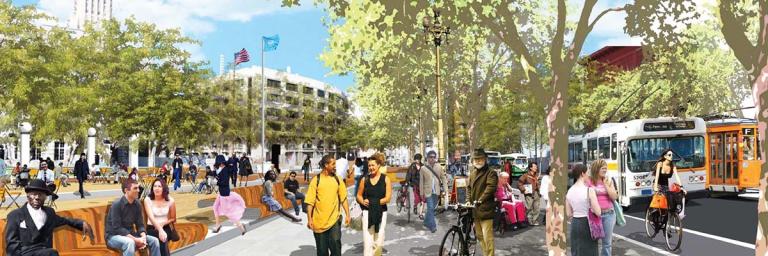In 2016, the U.S. Department of Transportation challenged mid-population cities to come up with the most effective and equitable way to further the adoption of shared, connected, autonomous vehicles. Our plan built on San Francisco’s leadership in shared transportation infrastructure, including public transit, carshare and bikeshare, as well as other emerging mobility services and technologies based right here in San Francisco.
By moving away from a system of private ownership to a shared transportation system, we can ensure that all San Franciscans get to benefit from these innovations. Advanced sensors on these connected vehicles will eliminate traffic fatalities and reduce the amount of space needed for our transportation system, allowing us to repurpose public space currently underutilized as parking into affordable housing, small parks and pedestrian amenities.
Though this grant was ultimately awarded to Columbus, Ohio, San Francisco was one of seven finalists for the award and was able to pursue other opportunities to advance. From these efforts, the city received an $11 million grant from the U.S. DOT’s Advanced Transportation and Congestion Management Technologies Deployment program to pursue the Smart Carpool Pilot, Smart Traffic Signals Pilot and other elements of the Smart City Challenge proposal.
- Planning
San Francisco's Challenge
A century ago, when the automobile first arrived, haphazard policies divided cities, spurred sprawl and prioritized vehicles over the needs of people. Health, safety and community cohesion took a back seat, with disastrous results.
Autonomous vehicles are this generation’s transportation revolution.
We can either shape these changes to benefit everyday people, or we will be resigned to a system that only works for a few. San Francisco is the right place to build the runway that will launch the country’s transportation future so that it everyone shares in its gains.
San Francisco's Vision
Our vision is to make more shared choices available so people of all backgrounds can easily get around without needing to own a car. By promoting shared options, we will ensure that more people can access affordable, safe, clean and reliable transportation than ever before. We’re making getting from A to B safer, easier and better for everyone.
San Francisco’s Approach
- Opportunity – Provide low-income residents with access to smart phones and banking services so they can benefit from mobile payments. Free public Wi-Fi will connect the many residents who cannot afford mobile data plans from private companies. Transportation prices would be affordable to all residents. Service would be provided around the clock so late-night service workers would have safe and affordable means to get home. Low-income areas would be better connected to transit. Vehicles in the program would all be accessible to people with disabilities.
- Safety – Eliminate fatal collisions through collision avoidance technology and connected vehicles, including after-market devices for cars and trucks that currently lack the technology.
- Shared – Shared vehicles will always be available to take you where you need to go, eliminating the stress and expense of owning and parking a car. Since the vehicles would be in use nearly continuously, most parking could be turned into mini parks, relaxation areas and affordable housing.
- Green – Vehicles would be electric to minimize air and noise pollution, including cargo vans and cargo bikes. The smart grid will be enhanced and more charging stations built.
- Community – Some improvements will be citywide; for others neighborhoods would apply to participate in pilot programs. That way changes happen at a pace that communities embrace and benefit from.
- Teach – Work with UC Berkeley and industry partners to test, analyze and disseminate best practices learned from these pilot programs to other transportation agencies, academics, and students across the United States and the world.
